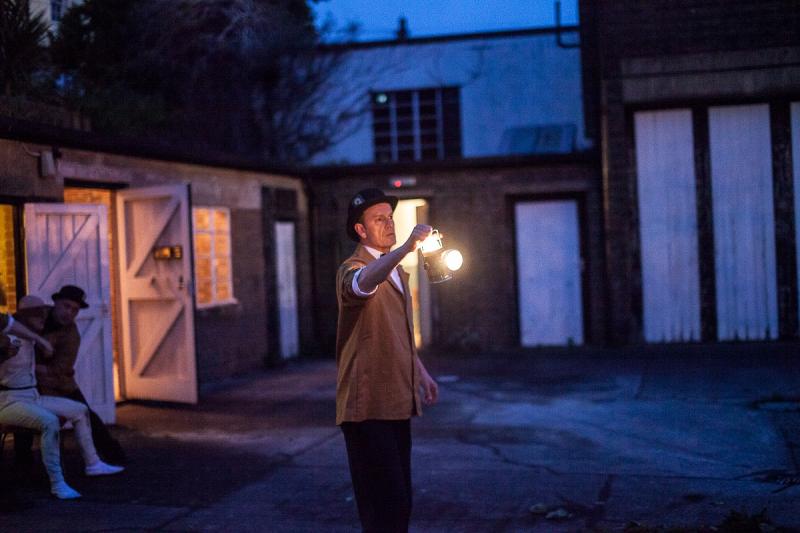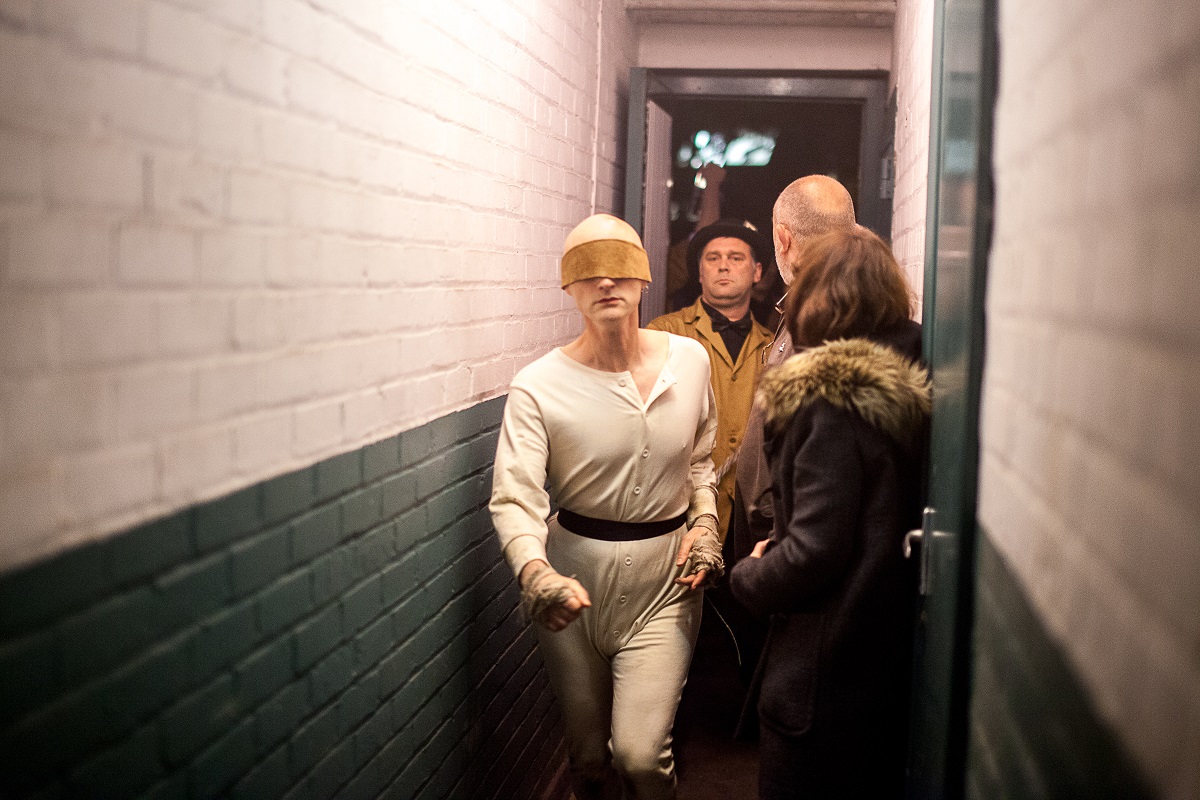Down by the Greenwood Side, Harvey's Depot, Lewes | reviews, news & interviews
Down by the Greenwood Side, Harvey's Depot, Lewes
Down by the Greenwood Side, Harvey's Depot, Lewes
Brighton Festival's site-specific presentation of Harrison Birtwistle is a treat

The question about Harrison Birtwistle’s Down by the Greenwood Side is: what is it? Designated by the composer as a “dramatic pastoral”, which is not very enlightening, it is not really an opera, nor a play with music, nor a piece of performance art, but somehow a winning combination of all three.
Commissioned by the Brighton Festival in 1969, the revival of Down by the Greenwood Side is part of the celebrations for the composer’s 80th-birthday year, and Sir Harrison was in the sold-out audience at the Sunday performance. But it is hard to connect the present Birtwistle, elder statesman of the new music scene, with the feisty, aggressive iconoclasm of this early piece.
The site-specific performance took place in the inspired location of a disused brewery depot in Lewes. The show started in the concrete yard, as the audience arrived. Nine bedraggled women quietly sang folksongs before moving in formation through the audience. St George (James Garnon) arrives on horseback, in a green string vest; a shaven, blindfolded prisoner arrives on a chain from the stables where he is kept. Four bowler-hatted and bow-tied Fight Club Men make preparations for a fight between St George and the shaven prisoner known as The Slasher (Nick Tigg). This is all before any music has started, except for an occasional tolling bell and gentle drum beat.
 Once we have moved inside, and the music starts, the story develops in two strands. In the middle of the room, on a raised boxing ring, St George (representing the coming of the new year) and The Slasher (representing winter) fight. St George is killed, twice, but returns to life. Meanwhile, on the raised grassy hillocks around the outside, a lone woman, Mrs Green, sings the ballad of a countrywoman who murders her twin sons. There is no interaction between these strands until the very end, when the stories start to blur.
Once we have moved inside, and the music starts, the story develops in two strands. In the middle of the room, on a raised boxing ring, St George (representing the coming of the new year) and The Slasher (representing winter) fight. St George is killed, twice, but returns to life. Meanwhile, on the raised grassy hillocks around the outside, a lone woman, Mrs Green, sings the ballad of a countrywoman who murders her twin sons. There is no interaction between these strands until the very end, when the stories start to blur.
This production of Down by the Greenwood Side is a riotous, baffling, bawdy and eclectic thing, but a definite success. The music from the nine-piece band underpins the spoken dialogue and the sung sections, but offers a discursive commentary on the action, rather than accompanying in a traditional sense. The music is typical Birtwistle, determined, resolute, noisy and unsentimental, and operates as a force of nature. The band and conductor Christopher Stark were excellent. Aside from the knockabout action on stage, which was well choreographed, the emotional heart of the music is in Mrs Green’s ballads. Here, Elizabeth Cragg’s singing was raw and heartfelt, although the words were hard to distinguish from the other side of the space.
But most praise must go to the director, Susannah Waters, who found a visual language that made sense of the more insane elements of the score, and created a performance which fit so snugly into its venue that they could have been made for each other. Ultimately, it does not matter what Down by the Greenwood Side is: it is, gloriously and eccentrically, what it is, and that should be celebrated.
rating
Explore topics
Share this article
The future of Arts Journalism
You can stop theartsdesk.com closing!
We urgently need financing to survive. Our fundraising drive has thus far raised £49,000 but we need to reach £100,000 or we will be forced to close. Please contribute here: https://gofund.me/c3f6033d
And if you can forward this information to anyone who might assist, we’d be grateful.

Subscribe to theartsdesk.com
Thank you for continuing to read our work on theartsdesk.com. For unlimited access to every article in its entirety, including our archive of more than 15,000 pieces, we're asking for £5 per month or £40 per year. We feel it's a very good deal, and hope you do too.
To take a subscription now simply click here.
And if you're looking for that extra gift for a friend or family member, why not treat them to a theartsdesk.com gift subscription?
more Opera
 Tosca, Welsh National Opera review - a great company reduced to brilliance
The old warhorse made special by the basics
Tosca, Welsh National Opera review - a great company reduced to brilliance
The old warhorse made special by the basics
 BBC Proms: The Marriage of Figaro, Glyndebourne Festival review - merriment and menace
Strong Proms transfer for a robust and affecting show
BBC Proms: The Marriage of Figaro, Glyndebourne Festival review - merriment and menace
Strong Proms transfer for a robust and affecting show
 BBC Proms: Suor Angelica, LSO, Pappano review - earthly passion, heavenly grief
A Sister to remember blesses Puccini's convent tragedy
BBC Proms: Suor Angelica, LSO, Pappano review - earthly passion, heavenly grief
A Sister to remember blesses Puccini's convent tragedy
 Orpheus and Eurydice, Opera Queensland/SCO, Edinburgh International Festival 2025 review - dazzling, but distracting
Eye-popping acrobatics don’t always assist in Gluck’s quest for operatic truth
Orpheus and Eurydice, Opera Queensland/SCO, Edinburgh International Festival 2025 review - dazzling, but distracting
Eye-popping acrobatics don’t always assist in Gluck’s quest for operatic truth
 MARS, Irish National Opera review - silly space oddity with fun stretches
Cast, orchestra and production give Jennifer Walshe’s bold collage their all
MARS, Irish National Opera review - silly space oddity with fun stretches
Cast, orchestra and production give Jennifer Walshe’s bold collage their all
 Káťa Kabanová, Glyndebourne review - emotional concentration in a salle modulable
Janáček superbly done through or in spite of the symbolism
Káťa Kabanová, Glyndebourne review - emotional concentration in a salle modulable
Janáček superbly done through or in spite of the symbolism
 Buxton International Festival 2025 review - a lavish offering of smaller-scale work
Allison Cook stands out in a fascinating integrated double bill of Bernstein and Poulenc
Buxton International Festival 2025 review - a lavish offering of smaller-scale work
Allison Cook stands out in a fascinating integrated double bill of Bernstein and Poulenc
 Tosca, Clonter Opera review - beauty and integrity in miniature
Happy surprises and a convincing interpretation of Puccini for today
Tosca, Clonter Opera review - beauty and integrity in miniature
Happy surprises and a convincing interpretation of Puccini for today
 Hamlet, Buxton International Festival review - how to re-imagine re-imagined Shakespeare
Music comes first in very 19th century, very Romantic, very French operatic creation
Hamlet, Buxton International Festival review - how to re-imagine re-imagined Shakespeare
Music comes first in very 19th century, very Romantic, very French operatic creation
 Falstaff, Glyndebourne review - knockabout and nostalgia in postwar Windsor
A fat knight to remember, and snappy stagecraft, overcome some tedious waits
Falstaff, Glyndebourne review - knockabout and nostalgia in postwar Windsor
A fat knight to remember, and snappy stagecraft, overcome some tedious waits
 Salome, LSO, Pappano, Barbican review - a partnership in a million
Asmik Grigorian is vocal perfection in league with a great conductor and orchestra
Salome, LSO, Pappano, Barbican review - a partnership in a million
Asmik Grigorian is vocal perfection in league with a great conductor and orchestra
 Semele, Royal Opera review - unholy smoke
Style comes and goes in a justifiably dark treatment of Handelian myth
Semele, Royal Opera review - unholy smoke
Style comes and goes in a justifiably dark treatment of Handelian myth

Add comment